Azerbaijan’s energy vision in focus at Shusha Global Media Forum
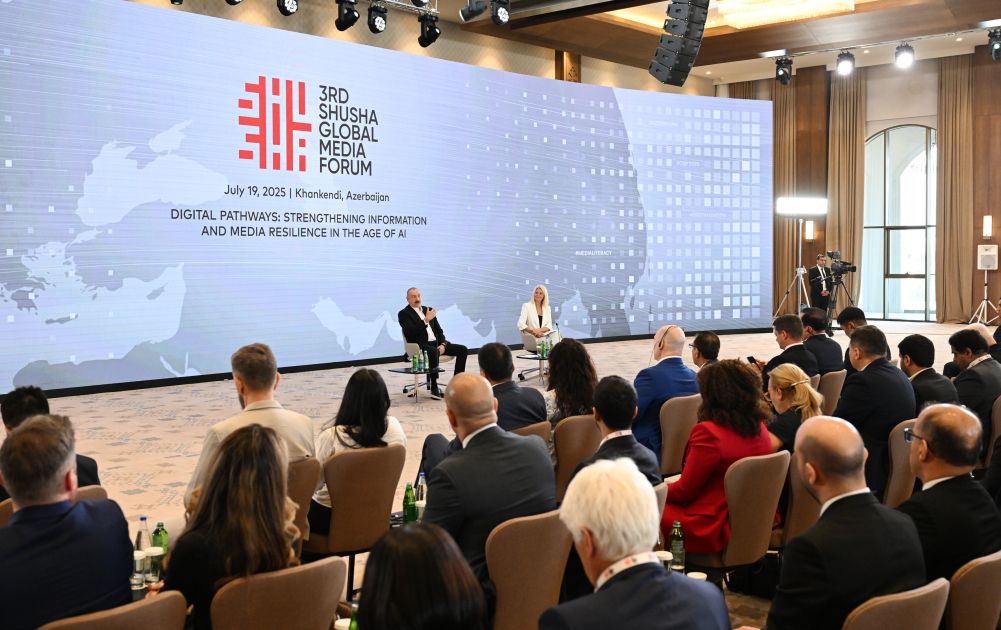
On the 150th anniversary of Azerbaijani media, a milestone deeply symbolic for a nation navigating modernity through memory and resilience, the city of Khankendi in the heart of Garabagh became the epicenter of global media dialogue. Azerbaijan hosted the 3rd Shusha Global Media Forum, bringing together leading journalists, analysts, and media thinkers from across continents. Against the backdrop of post-conflict reconstruction and rapid geopolitical change, President Ilham Aliyev seized the moment to deliver not only answers but a strategic narrative - on climate, connectivity, and global cooperation.
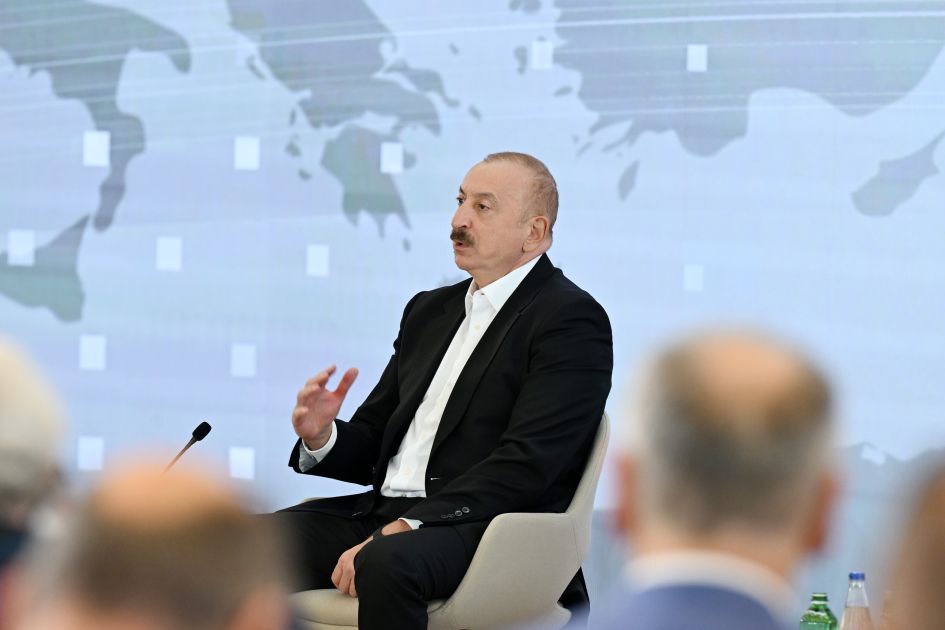
President Aliyev’s engagement with the press was not simply ceremonial. It marked an intentional act of strategic storytelling, aimed at repositioning Azerbaijan not merely as an energy exporter, but as a regional power broker and a bridge between the fossil-fueled past and the green-powered future.
In response to a question about the legacy of COP29, posed by Klaus Peter Ralf Jurgens (Director of Economyfirst Limited, UK), President Aliyev described the conference as a milestone - not just for Azerbaijan, but for the global climate agenda.

He emphasized the significance of hosting nearly 200 countries, including 70 heads of state and government, and over 77,000 registered participants. For many, visiting Azerbaijan was a first - turning the country into a discovery in both environmental and diplomatic terms.
President Aliyev stated that Azerbaijan’s contribution to the climate agenda stems from its existing energy structure. The country does not use coal or fuel oil for electricity generation, relying instead on natural gas, hydropower, and increasingly, solar energy.
Looking ahead, the President underlined Azerbaijan’s green targets and said: "By 2030, based on already signed investment contracts, we will have a minimum of six gigawatts of green energy, including solar, wind, and hydro. Hydro is primarily produced here in this area — in Garabagh and East Zangezur. We have already inaugurated more than 30 small hydropower stations with a total capacity of 280 megawatts."
While reaffirming Azerbaijan’s commitment, President Aliyev also stressed a pragmatic perspective on global climate efforts. He pointed out that countries most responsible for emissions should shoulder the burden, and warned that completely abandoning fossil fuels is not realistic in the near term.
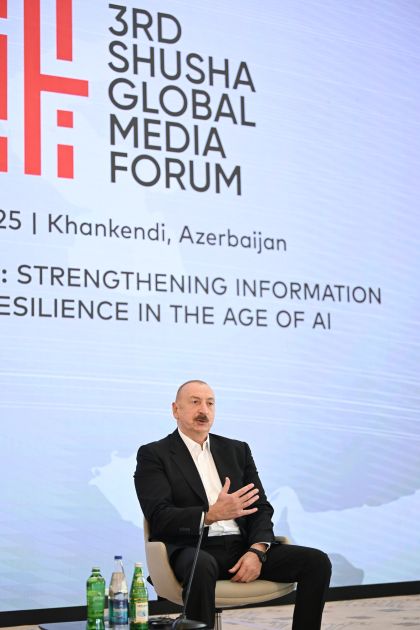
He explained: "...without fossil fuels, in the foreseeable future, the world cannot function. Economies cannot function, planes cannot fly, and everything would come to a halt. So, we must approach this from a realistic point of view."
The President also highlighted Azerbaijan’s diplomatic role during COP29, particularly in fostering consensus between the Global North and Global South, noting that the country was seen as a bridge-builder during the negotiations.
Among the tangible achievements of COP29, he pointed to the long-awaited agreement on Article 6 - related to carbon markets - and the tripling of climate finance commitments from $100 billion to $300 billion. While acknowledging that not all countries were satisfied, he emphasized that this was a fair and significant outcome.
When asked by Professor Paolo Liebl von Schirach, President of the Global Policy Institute (Washington, DC), about drivers of regional development and foreign investment, President Aliyev focused on connectivity and infrastructure.

He described the Middle Corridor - a transport and energy route stretching from East Asia to Western Europe - as an increasingly important vector linking countries across the region. According to the President, geography alone is not enough to ensure success. It must be combined with stability, strategic planning, and constructive relations.
He stressed the growing role of green energy projects in Azerbaijan and Central Asia. The agreement signed by the presidents of Azerbaijan, Uzbekistan, and Kazakhstan during COP29 to build a subsea green energy cable under the Caspian Sea is a major step toward connecting Central Asia’s renewable potential to Azerbaijan’s grid. Similarly, the agreement with Georgia, Romania, and Hungary to build a green cable under the Black Sea expands that connectivity into Europe.
The President said: "Azerbaijan will become a kind of hub for green energy transmission, production, and distribution, with very big potential to grow and become even more global than it is today"
At the same time, he emphasized that traditional energy infrastructure remains vital. The Southern Gas Corridor is already operating at full capacity, and gas exports to Europe have increased from 8 billion cubic meters in 2021 to 13 billion cubic meters - nearly half of Azerbaijan’s total gas exports.
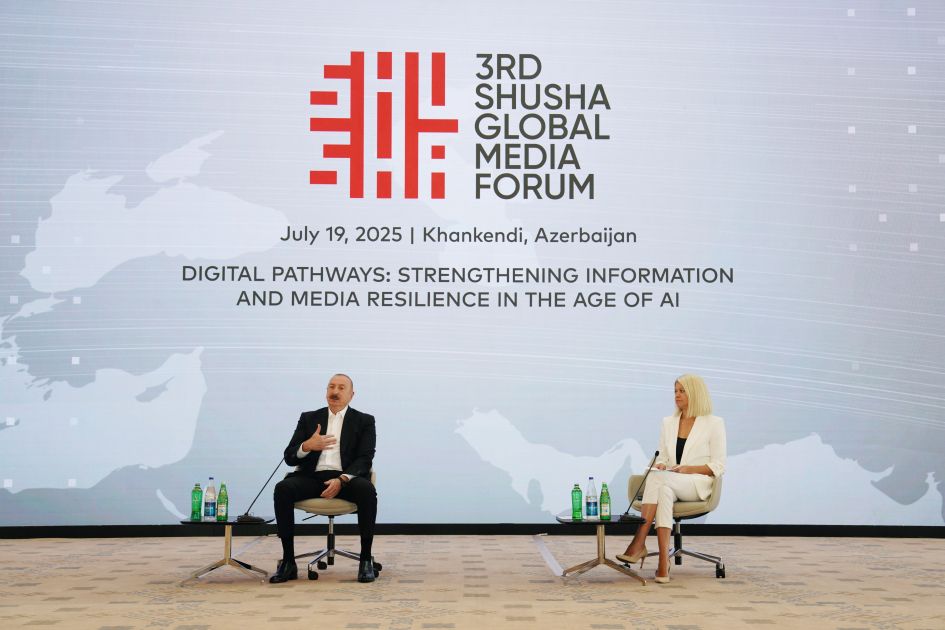
However, Ilham Aliyev highlighted a critical challenge: European financial institutions, such as the EIB and EBRD, have limited or stopped financing fossil fuel projects. Without new funding, further expansion of Azerbaijan’s gas capacity is constrained - even as European demand continues to grow.
He stressed: "To expand it, we need funds. We need borrowed money. So, I think that European institutions should consider this situation and revise their policies so that funding can be attracted. And under these circumstances, what today seems like a done deal can actually grow."
President Aliyev’s key message was cooperation: Let’s work as a team - that’s what we have suggested: our European partners and Azerbaijan... we are ready to be instrumental.
In response to a question by Zhong Zhong, Chief Correspondent of the Baku branch of Xinhua News Agency, President Aliyev addressed Azerbaijan’s cooperation with China - especially within the context of the Great Return to Garabagh.
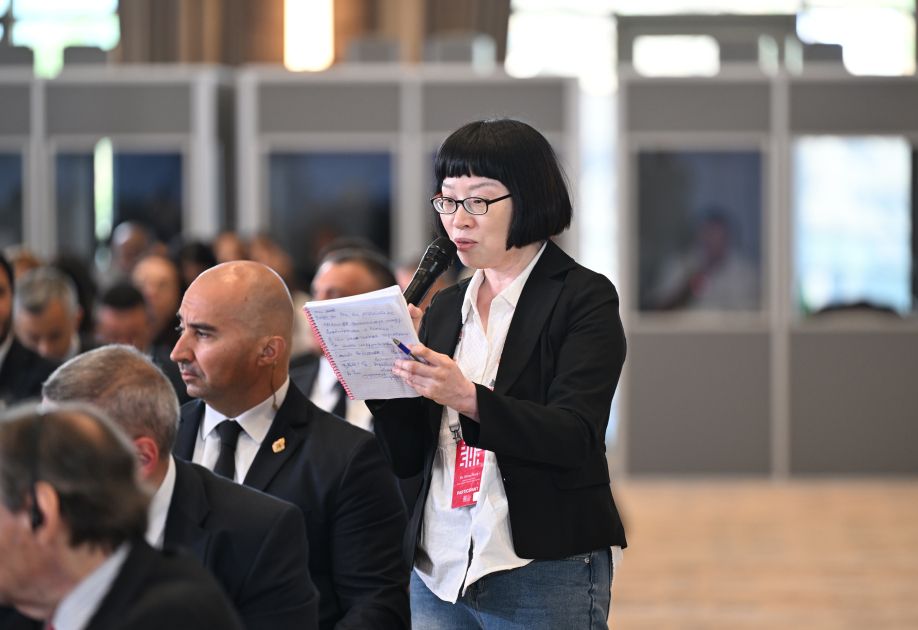
He stated that Chinese companies are already deeply involved in the implementation of solar power plant projects in Azerbaijan, including as suppliers of solar panels. More recently, the partnership has extended into direct cooperation in solar and wind energy production. Agreements have been signed with Chinese firms, and the President expressed optimism about continued and mutually beneficial collaboration.
The President's remarks suggested that Chinese companies have a meaningful role to play in rebuilding Garabagh through green investments, positioning energy cooperation as part of the wider development effort in formerly occupied territories.
From Khankendi, in a city that once symbolized division and now represents reconstruction and reintegration, President Ilham Aliyev presented a clear and consistent outlook: Azerbaijan is committed to the green transition, but it will be pursued on realistic, fair, and strategic terms.
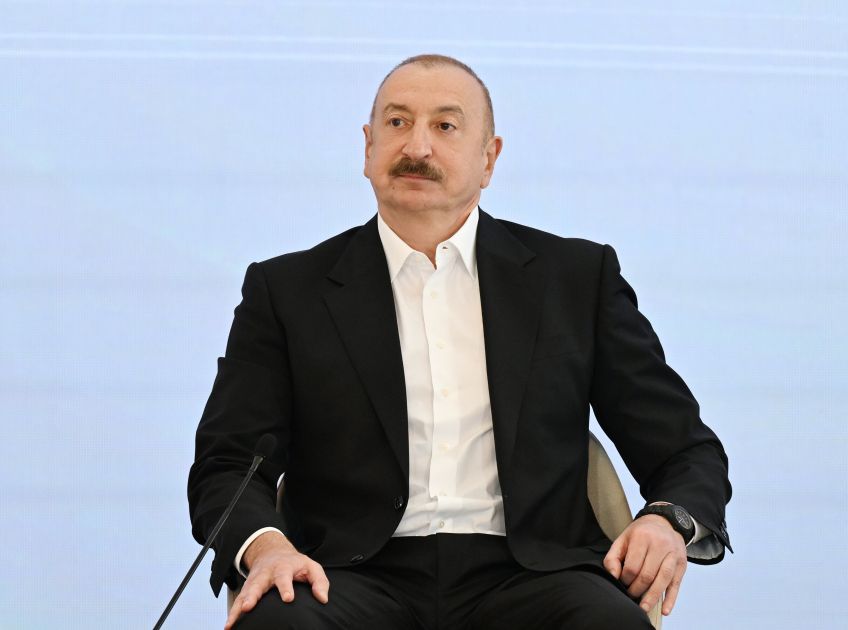
Whether through landmark COP29 achievements, cross-regional energy corridors, or pragmatic diplomacy with both East and West, Azerbaijan aims to serve as a connector - of infrastructure, of markets, and of global interests.
The message from the 150th anniversary of Azerbaijan’s media, delivered from the heart of Garabagh, was unmistakable: the country is building its future - green, global, and grounded in its own priorities.
Here we are to serve you with news right now. It does not cost much, but worth your attention.
Choose to support open, independent, quality journalism and subscribe on a monthly basis.
By subscribing to our online newspaper, you can have full digital access to all news, analysis, and much more.
You can also follow AzerNEWS on Twitter @AzerNewsAz or Facebook @AzerNewsNewspaper
Thank you!

